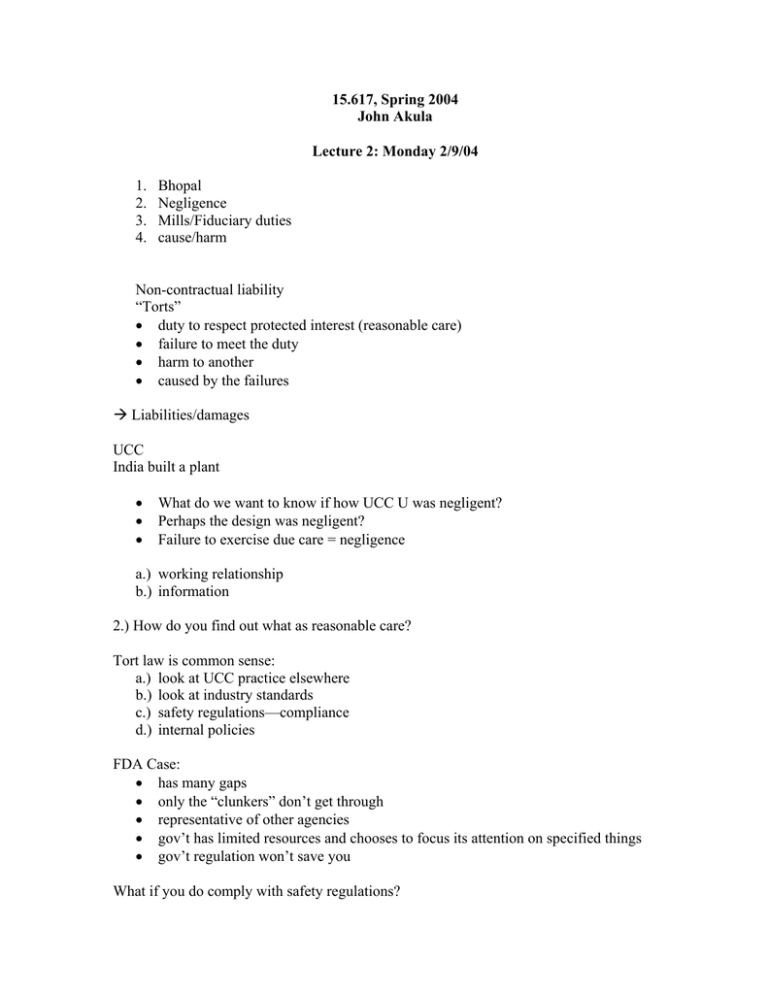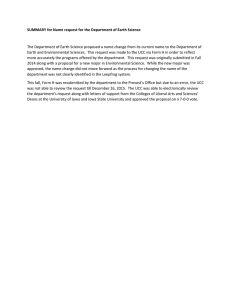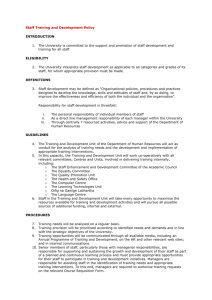Document 13617002
advertisement

15.617, Spring 2004 John Akula Lecture 2: Monday 2/9/04 1. 2. 3. 4. Bhopal Negligence Mills/Fiduciary duties cause/harm Non-contractual liability “Torts” • duty to respect protected interest (reasonable care) • failure to meet the duty • harm to another • caused by the failures Æ Liabilities/damages UCC India built a plant • • • What do we want to know if how UCC U was negligent? Perhaps the design was negligent? Failure to exercise due care = negligence a.) working relationship b.) information 2.) How do you find out what as reasonable care? Tort law is common sense: a.) look at UCC practice elsewhere b.) look at industry standards c.) safety regulations—compliance d.) internal policies FDA Case: • has many gaps • only the “clunkers” don’t get through • representative of other agencies • gov’t has limited resources and chooses to focus its attention on specified things • gov’t regulation won’t save you What if you do comply with safety regulations? • safety is highly a matter of negotiations with gov’t regulators (fundamentally different type of inquiry, but you can win on a cost-benefit analysis) • Internal policies are like New Year’s ResolutionsÆfleeting. • You have to have reasonable standards. Question by student; “How do you live with standards?” Ans: Some companies have problems articulating why they have different standards. In general, as prosperity goes up, so do standards. Companies tend to decentralize the decision process. Limited liability: A shareholder is liable only for its investment. Is this a problem? UCC US can say you are interfering with the essence of a corp. (ll) Yes: passive shareholder (ll) UCC US set the whole thing up and is heavily involved. Shareholder will not protect them. Wickline: HMOs Prospective review: you first consult your consultants Polznsky: attending physician Glassing: works for HMO Arguing that Polensky didn’t ask. • HMO loses the holding, but they won. • You can’t write out specific rules. • Fiduciary rules (2 kinds) o Care o Train doctors o Research • Fiduciary duties are to patients, but they are not absolute. • Conflicts are not necessarily tempting. (they can be structured) • Fiduciary in Mills (collegial) • Manage the corporation (but, what does this mean?) • “non-delegable duty” • “delegation” in the Mills Case • Loyalty to Board (but lawyers say to the “Firm”) v. loyalty to management. • Inside Directors v. outside Directors. • Business Judgment Rule (see page 19, second paragraph)


